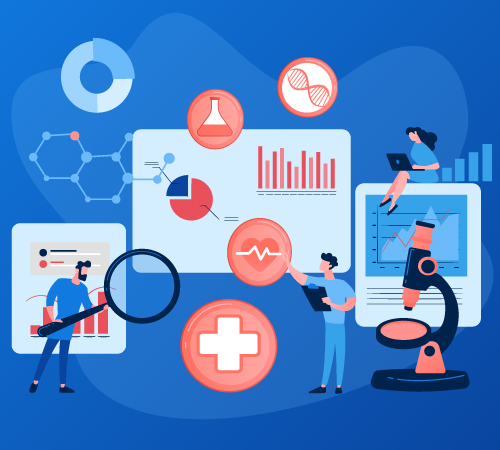Data analytics is developing and modulating in new and exciting ways, bringing a digital revolution in multiple industries and transforming the healthcare sector. With the increasing involvement of data analytics in the healthcare industry, data experts can analyze the raw data stored in their database and draw meaningful conclusions that lead to improved patient care and reduced costs.
Data gathered from disparate sources allow healthcare providers to validate the diagnostic inclinations and track their patients’ ailments, treatment options, and outcomes. Even though there are myriad ways experts can effectively use data analytics, the guide reveals a few ways the latest technology influences the healthcare sector.
Why Is Data Analytics In Healthcare Important?
As per the report of Allied Market Research, the global healthcare analytics market will reach $96.90 billion by 2030 – with a 15.3% CAGR in the past ten years. Data analytics in the healthcare sector provide doctors and administrative staff with the necessary information and data to improve patient care and speed up treatment.

ALSO READ: Best Questions to Ask Before Choosing a Cloud Data Security System
The adoption of new technologies helps medical experts to streamline recurring tasks, ensure the accuracy of the treatment provided, and offer remote care to patients. The data-driven model allows doctors to modify the medical treatment based on the patient’s health history, which secures the future of data analytics in the upcoming years. A few other important aspects of data analytics in the medical industry include the following:
- Healthcare analytics help doctors derive actionable insights and generate reports to improve patient health decisions.
- Data stored in an organization helps administrative staff schedule doctor appointments and end patient waiting periods.
- Electronic health records of patients help medical care providers build a database to recommend the best treatments and surgeries to patients.
- Fitness trackers, glucose monitors, and heart monitors are some of the cutting-edge data analytics tools that will boost patient engagement and help patients become more responsible for their health.
Data Analytics Transforming Healthcare Industry
Business Intelligence and Artificial Intelligence will help healthcare identify loopholes, make strategic decisions, improve operational efficiency, reduce unnecessary costs, and save time by automating recurring tasks. Here are the main aspects in which data analytics will transform the healthcare sector in 2022 and beyond.
- Facilitate Better Diagnostic
Using data analytics correctly allows healthcare professionals to utilize the stored data to ensure the accuracy and dosage of the prescribed treatments. Patients can benefit from accurate and quick diagnostics when doctors offer care based on previous health data.
Inferenz data analytics experts can help professionals identify the best model, handle the imbalanced dataset, and improve their business with the latest technologies. The team has recently helped a pharmaceutical company from Germany to predict health alerts based on the patient’s vital parameters. Check out the case study here.
- Helping Patients At High-Risk
Digitized healthcare data allows healthcare professionals to monitor patient behavior and health closely. Tools like predictive analytics will help doctors identify patients at high risk of chronic diseases and deliver personalized services to treat the diseases quickly and accurately.
- Eliminating The Human Error
A human error in prescribing medications or dosage can not only cause health concerns in patients but also increase hospital expenses. A Business Intelligence tool will focus on the patient’s health history and ensure that the treatment suggested will work positively for the patient.
- Better & Personalized Help
With the integration of data and analytics in the medical field, healthcare organizations can focus on treating patients based on their lifestyles, genetics, environment, and present health condition. The holistic approach in healthcare will allow patients to leverage the benefits of precise and personalized treatments while helping practitioners to reduce unwanted costs by avoiding ineffective treatments.
- Tracking Patient Health
Effective preventative healthcare involves identifying a potential health problem and suggesting measures to eradicate it in real-time. Ongoing health tracking will prevent diseases from being severe and help health providers offer the best care at the optimal time. The extensive growth of data analytics in the healthcare sector will assist professionals in tracking patients’ statistics effectively.
ALSO READ: Predict health alert based on patient’s vital parameters
Transform Your Healthcare Organization With Data Analytics
As data analysis continues to evolve and become inseparably tied to different aspects of the healthcare sector, healthcare professionals will follow a holistic treatment approach to provide better diagnostics and improve patient health and wellness in 2022 and beyond. The future of healthcare analytics in the medical sector is fascinating as more professionals will focus on implementing modern medical technology in 2023.
If you are a healthcare expert who wishes to leverage data analytics, contact the data experts of Inferenz. The team can help you identify how data analytics can transform your healthcare organization.











